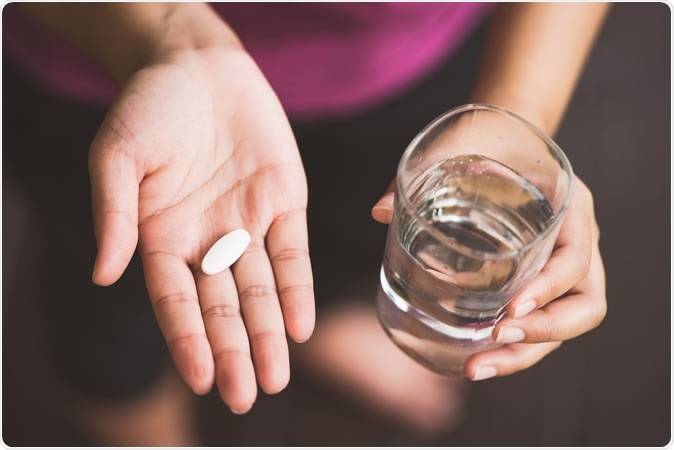The market is flooded by supplements that claim to boost brain power and stave off dementia. Some of these supplements may not be harmless finds a study. These supplements have been found to contain high portions of an unapproved drug called Piracetam. The study titled, “Presence of Piracetam in Cognitive Enhancement Dietary Supplements,” was published this week in the JAMA Internal Medicine.

Image Credit: MIA Studio / Shutterstock
Piracetam and its congeners are known as “nootropics”. These have been approved prescription use in Europe but are not approved for use in the United States, write the researchers. These drugs are capable of side effects such as depression, anxiety, drowsiness, weight gain, sleep problems etc. the team wrote, “Brain enhancement supplements or “nootropics” have become increasingly popular, with US sales exceeding $640 million in 2015 alone.”
The team of researchers found that some of the brands of brain supplements contained at least 20 percent more than what was declared on the labels. If taken as per the directions on the labels, the consumers would be taking in around 11,000 milligrams of the drug each day wrote the researchers. Dr. Pieter Cohen, a general internist at the Cambridge Health Alliance and an associate professor of medicine at Harvard Medical School, first author of the study said in a statement, “As soon as we move into dosages that are much higher than prescription, all bets are off about how these supplements might affect the brain.”
The experts say that most drugs need to undergo rigorous trials and paperwork before they are approved for use by authorities such as the US food and Drugs Administration (FDA). These nootropics or food supplements and nutraceuticals – as they are commonly called, are often classified as foods rather than drugs and thus their safety need not be proved in trials beforehand. It is this blind spot that the companies making these supplements take advantage of, they write. This study reveals that makers of these drugs have slipped in the nootropics in their brain supplements.
Cohen said, “The FDA has been crystal clear that piracetam should not be sold as a dietary supplement.” It was in 2004 that the FDA had banned the use of piracetam in the products used as supplements saying that it was not a “dietary ingredient” and should not be sold as such. The FDA says the products that contain piracetam are to be considered as a new drug and are not, “recognized as safe and effective for use under the conditions prescribed, recommended, or suggested in their labelling.” Cohen said that all these warnings were not heeded because they used a simple Google search to discover Piracetam in the brain supplements.
In their study they found 14 such brands of brain supplements that contained Piracetam. Of these two were not available for purchase and seven of the others did not claim to “dietary supplements” in their labels. These nine were excluded from the study and five were evaluated for Piracetam. The team bought two samples of each of the five brands and analyzed their contents.
Results revealed that one of the brands contained no Piracetam but the four others had 85 to 118 percent of Piracetam within them despite what was put on their labels. The amount of the drug varied in batches they found.
If the consumers followed the label instructions, they would be having 831 to 11,283 mg of Piracetam per day, found the researchers. Cohen said this was way beyond the “highest amount that is routinely prescribed for cognitive disorders” in Europe. He explained that the kidneys of the consumers are not capable of metabolizing such high doses of the drug and since these drugs are taken by the elderly who already have declining kidney functions, the results could be catastrophic.
The team explained that Piracetam was first marketed in Europe in 1971 and was claimed to be the first nootropic drug that could improve cognitive functions of the brain without causing sedation or stimulation of the brain. The drug is not used in Europe for involuntary muscle spasms and in some cases of learning difficulties among children. Risk of dementia and progress of memory loss is also one of the uses of the drug in Europe. A 2001 Cochrane systematic Review showed that there is little or no research that proves the efficacy of Piracetam in any of these indications of use however.
The experts on the team thus concluded that the presence of Piracetam in these brain supplements means that the makers have failed in keeping up to the regulations. They have added an unapproved drug in their supplements and also used a substance that has no proven benefit says Cohen. He added that despite FDA warnings, no steps have been taken to stop this practice. Cohen said, “They have not seized products containing piracetam. They have not put out a warning to consumers.” The researchers have called for stricter labelling regulations and warn consumers and clinicians about the false claims made by the makers of such brain supplements.
The team wrote in conclusion, “Our findings demonstrate that even after the FDA rejected an application to market piracetam as a new supplement ingredient, the drug was nevertheless introduced into the marketplace. Despite FDA warning letters, the products remain on the market. Until the law governing supplements is reformed such that products adulterated with drugs can be effectively removed from the market, clinicians should advise patients that supplements marketed as cognitive enhancers may contain prohibited drugs at supratherapeutic doses.”
Journal reference:
Cohen PA, Zakharevich I, Gerona R. Presence of Piracetam in Cognitive Enhancement Dietary Supplements. JAMA Intern Med. Published online November 25, 2019. doi: https://doi.org/10.1001/jamainternmed.2019.5507